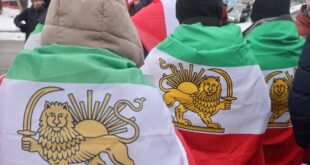TEHRAN — Iranian President Mahmoud Ahmadinejad has tightened his grip on the interior ministry by appointing his right-hand man to a key post just weeks ahead of two sets of elections, analysts said.
The naming of Mojtaba Hashemi Samareh as deputy interior minister for political affairs is a tactical move that underlines the importance of the December 15 municipal and Assembly of Experts elections. “The new appointment shows the importance of the upcoming elections for Mr Ahmadinejad,” said Amir Mohebian, a conservative political analyst and the head of the Arya news agency.
“With this appointment the president wants to lower the possibility of powerful political currents interfering in the elections and to organise an election without any doubts.” Few men are closer to the president than Hashemi Samareh.
He has known Ahmadinejad since they were students, served as his chief adviser when he was mayor of Tehran and was sent by the president on a mission earlier this month to Paris with a message on Iran’s nuclear programme for French President Jacques Chirac.
In his inauguration ceremony on Wednesday, Hashemi Samareh vowed: “The new government [of Ahmadinejad] was elected to power with Islam, the Imam [Ayatollah Ruhollah Khomeini] and the revolution as their slogans.” In his new post, Hashemi Samareh will be charged with organising elections in Iran, a position that gives him a say in how the process is run and also a powerful voice in how domestic policy is shaped.
He will also have some control over all 30 Iranian provincial governor-generals and chair a supervisory board which issues licences for political parties and NGOs. He will stay on as senior adviser to Ahmadinejad.
According to an editorial in the reformist Etemad Melli newspaper, Hashemi Samareh is the ideas man behind the formation of the Cabinet and the political decisions taken by Ahmadinejad. He has been a constant presence with Ahmadinejad during almost all of the president’s domestic and international visits.
The elections, just two-and-a-half months away, are the first time that Iranians will be called to the polls since the June 2005 presidential vote that handed Ahmadinejad the stunning landslide victory on a wave of popular support.
The 86-member Assembly of Experts (AE) is considered one of the main pillars of clerical supremacy in national politics and supervises the work of supreme leader Ayatollah Ali Khamenei.
Members of the assembly, which appoints and can also oust the supreme leader, must be experts in Islamic jurisprudence and are elected by direct public vote to eight-year terms. The last such election was in 1998. In the municipal elections, Iranians will elect councillors across the country for what will be the first true test of Ahmadinejad’s popular support since his election.
The AE and most of the Iranian major city councils and mayors are conservative controlled.
In capital Tehran the conservatives swooped to power in municipal elections in 2002, their first victory in a string of electoral successes that later saw Ahmadinejad elected Tehran mayor and then president. Vetting for the AE election is carried out by the unelected Guardian’s Council and for the municipal elections the screening is carried out by the conservative-held parliament.
“Ahmadinejad will now have closer and more overt control over the interior ministry, and now Ahmadinejad can go forward more effectively with his election promises,” said the editor-in-chief of Aftab-e Yazd newspaper, Mojtaba Vahedi.
“Most of Ahmadinejad’s speeches and decisions bore the stamp of Hashemi Samareh’s advice.
“What is important for Mr Ahmadinejad is the outcome of the municipal elections. A victory can be a boost to (the conservatives’) morale since their climb to power started with the municipal elections,” he added.
A reformist analyst agreed that the elevation of Hashemi Samareh showed the importance of the elections to the government and feared it spelled bad news for the reformists’ chances.
“Surely with this appointment, the authorities at any cost want to prevent the reformists and even the independents getting to elected posts and they do not care about the world and domestic public opinion,” said Issa Saharkhiz.
 Eurasia Press & News
Eurasia Press & News



